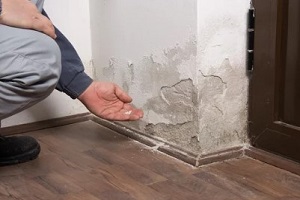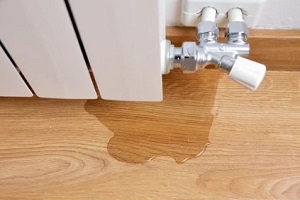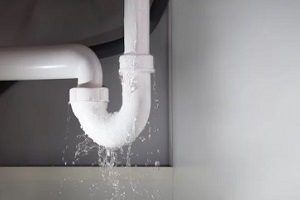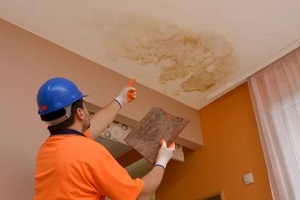 Water can create many costly and even dangerous damages within your home. Some of the most severe damage includes that which is done to your home’s roof, the foundation and mold occurring anywhere in your home. While structural damage is visibly noticeable, this may not always be the case with mold, which can have many undesired effects on your health.
Water can create many costly and even dangerous damages within your home. Some of the most severe damage includes that which is done to your home’s roof, the foundation and mold occurring anywhere in your home. While structural damage is visibly noticeable, this may not always be the case with mold, which can have many undesired effects on your health.
Unfortunately, you are not always able to be present in your home, to guard it against the dangers of unwanted moisture. However, the ten tips below will help you protect your home from water damage, even when you’re away.
1. Be Attentive to Your Water Pressure
The water flow to your home will usually remain the same, so if you are experiencing lower water pressure, that may be a good indicator that water is leaking out elsewhere before reaching your faucet.
Remain attentive to signs of a leak, such as low water pressure, to prevent small leaks from turning into larger problems.
2. Install Leak Detection Devices
There are many types of leak detectors. Some are made to be placed closely to items prone to leaks and will alert you when they come in contact with water. Others, however, are more sensitive and can detect leaks in larger areas before they physically come into contact with water.
Devices such as these will help you detect a leak in time to repair it and dry the leak before extensive damage occurs.
3. Check Pipes and Appliance Hoses Regularly
 If you regularly monitor your indoor pipes and hoses, you can usually spot wear and tear in them before a leak begins. It is also a good idea to replace the hoses on appliances such as your dishwasher and washing machine every five years, even if they appear to be in good condition.
If you regularly monitor your indoor pipes and hoses, you can usually spot wear and tear in them before a leak begins. It is also a good idea to replace the hoses on appliances such as your dishwasher and washing machine every five years, even if they appear to be in good condition.
Most home insurance policies exclude certain types of water damage, including water damage that results from not properly maintaining pipes.
Stay on top of the upkeep of your pipes to avoid being stuck with the cost of damage from a leak.
4. Keep Your Gutters Clean
Most people associate water damage with leaky pipes inside the home. But unfortunately, outside sources, such as clogged gutters, can create extensive water damage on the inside of the home.
If water cannot flow freely through your gutters it can overflow. This overflow can seep into the lower foundation and the walls of your home.
5. Maintain Your Drains
 Substances that are washed down the drains in your home could increase your chances of creating a leak. For example, if you frequently pour grease down the drain in your kitchen sink, the grease can build up in your pipes and prevent proper water flow.
Substances that are washed down the drains in your home could increase your chances of creating a leak. For example, if you frequently pour grease down the drain in your kitchen sink, the grease can build up in your pipes and prevent proper water flow.
It is also best to avoid pouring chemicals into your drains when they become sluggish or stopped. Some chemicals made to unclog your drains can erode the pipes, especially if you do not properly dilute them first.
6. Shut Off Water When Away
Shutting off the main valve when you are away from home for an extended period can keep you from returning home to unexpected, and possibly costly, damage to your home.
7. Prevent Busted Pipes
When temperatures drop below freezing, keeping a small, steady drip going in the faucet farthest from your main valve is best. This will keep water moving in your pipes and make them less likely to freeze. Additionally, we recommend opening your cabinets to help allow heat to reach your pipes.
In some cases, your pipes will freeze regardless of the efforts made to prevent it from happening. To help with this, install a pressure release valve to limit the water that enters your pipes after they freeze to prevent them from bursting.
8. Inspect Your Roof and Chimney
A leaky roof will give water easy access to the inside of your home. Consider inspecting your roof for any loose or missing shingles and replacing them. For metal roofs, look for small holes, rust or misplaced panels.
If you have a chimney, inspect the metal flashing thoroughly. The bottom of this piece should be sealed tightly and secured to the roof snugly. Additionally, ensure that there are no gaps present between this metal piece and the chimney itself.
9. Shut Off Water Until Leaks are Repaired
 Even with small leaks, you should shut off your main water valve while you repair a leak. If the water is being absorbed into the surrounding materials, it may be unnoticeable how much water is actually being stored.
Even with small leaks, you should shut off your main water valve while you repair a leak. If the water is being absorbed into the surrounding materials, it may be unnoticeable how much water is actually being stored.
It is also a good idea to leave your faucet running while you shut off the main valve. This will help drain any excess water from the pipes to prevent additional water from being spilled during the repair.
10. Fix Leaks Immediately
Even the smallest leaks can result in a much bigger and more costly issue if they are not promptly corrected. Allowing water to settle into the surrounding floors and walls can cause mold and structural damage, and in rare cases, electrical malfunctions if the moisture reaches your wiring.
Speak to an Experienced Agent Today
It is never too late to protect your property and secure the investment that you’ve made in it. If you are upgrading a current policy, or starting with a new home, Pro Insurance Group can help.
Contact an experienced agent at Pro Insurance Group to discuss measures for protecting yourself from the costly damage water can cause. Call (833) 619-0770 or request a quote online, and an agent will contact you to discuss your policy needs.
